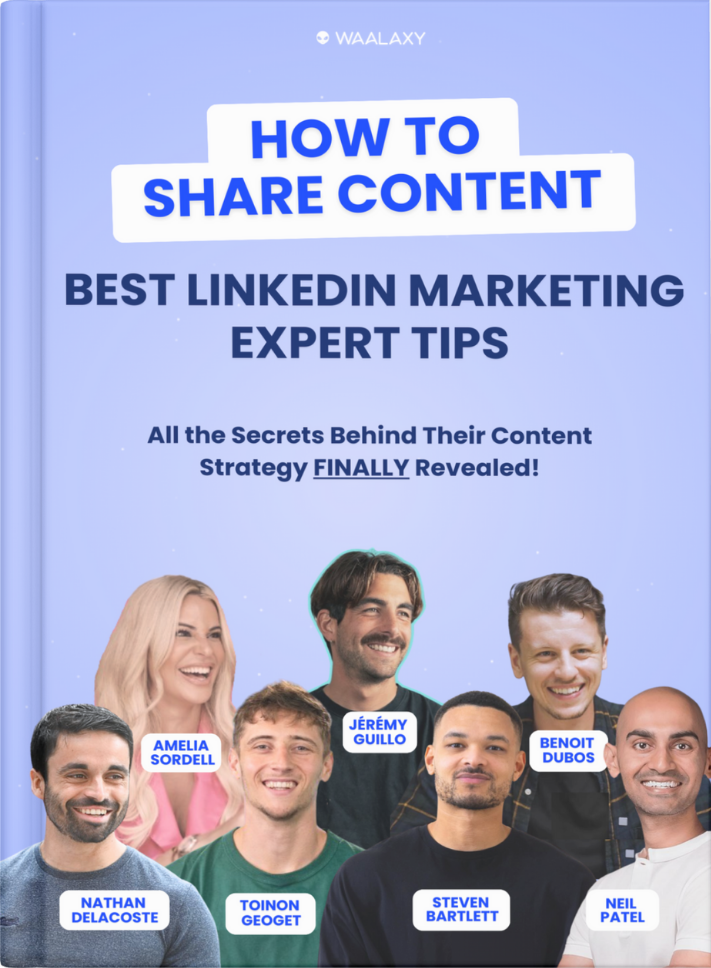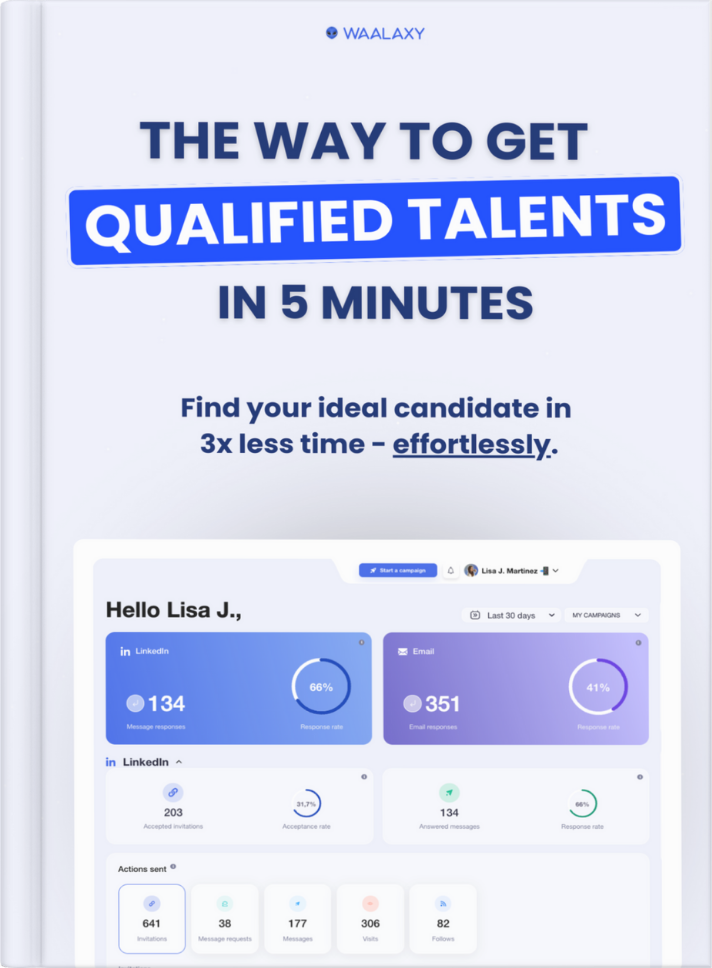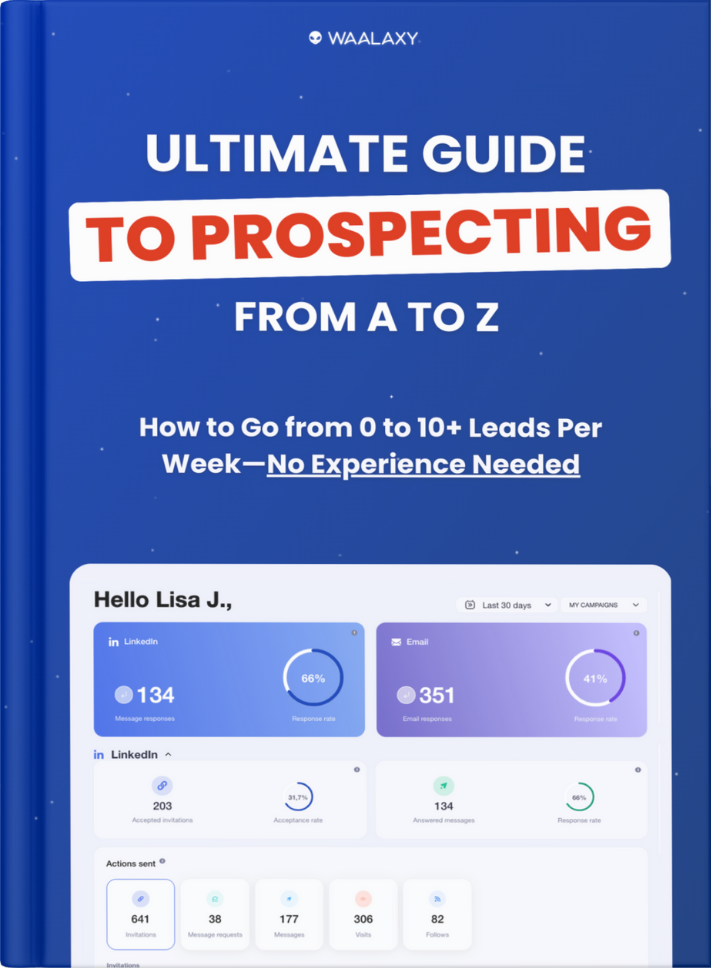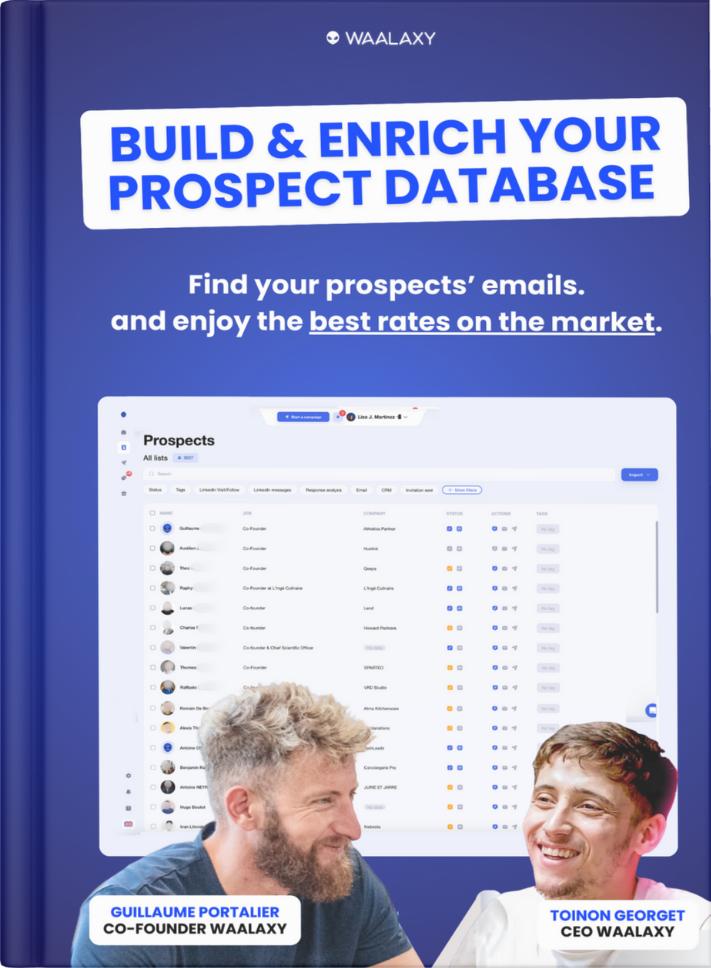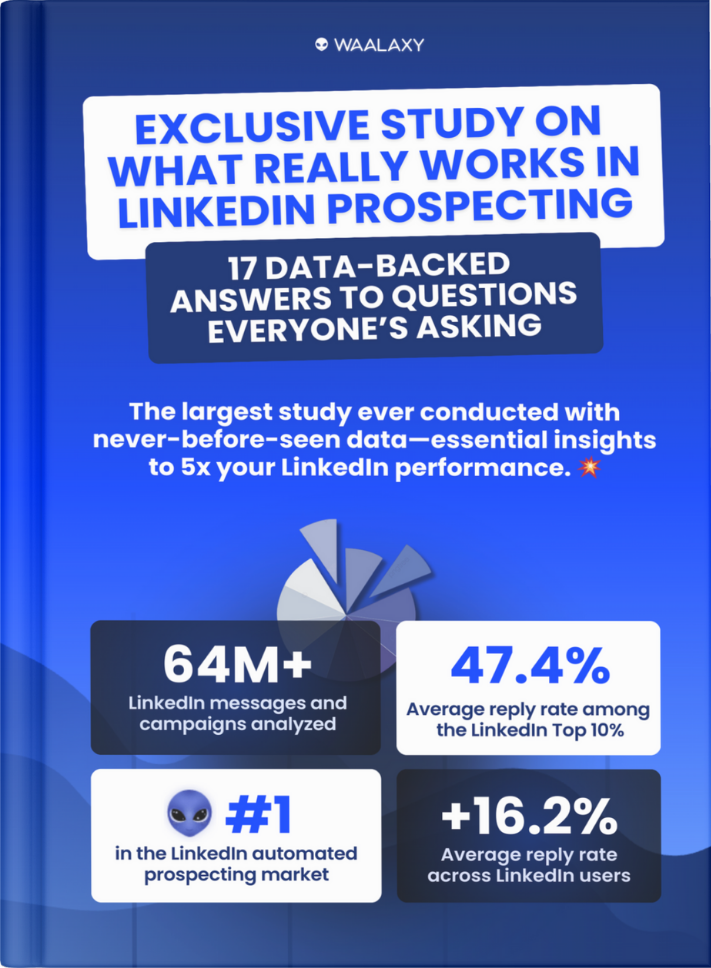- What is influencer marketing on LinkedIn?
- How to run LinkedIn influencer marketing campaign? 6 steps to follow
- Top LinkedIn influencer marketing tools to use
- LinkedIn influencer marketing campaign example
- Conclusion—Differences between LinkedIn influencer marketing and “standard”
- Frequently asked questions (FAQ) about influence on LinkedIn
LinkedIn influencer marketing is a particular type of influencer marketing strategy widely used to generate leads.
Influencer marketing is the art of collaborating with people who have an engaged audience to get a message across and guide a decision. ✨
On LinkedIn, we’re not looking to “buzz”: we want to build trust, share useful insights, and advance business topics with a pro audience.
Interested? We’ll tell you everything you need to know to build an effective LinkedIn influencer marketing strategy. 👇🏼
What is influencer marketing on LinkedIn?
Influencer marketing is a marketing strategy that involves partnering with people (called influencers) who have a strong influence marketing on a loyal, engaged audience that trusts their opinions and recommendations. 😎
Brands collaborate with them to promote their products or services to their followers on LinkedIn to increase awareness and boost sales by reaching new audiences thanks to the influencer’s credibility and authority. 🎯
What are the 3 R’s of influencer marketing? Relevance, reach, and resonance—three pillars that determine the impact of a collaboration.
The global influencer marketing market is projected to reach $32.55 billion in 2025, up from $24 billion in 2024 (strong growth on previous years).
LinkedIn influencer marketing is therefore approaching thought leadership (more than product placement). 🧠 People come to learn, compare, and understand markets, not to be entertained.
The relationship is built over time, around high value-added content on LinkedIn. Influencers/creators (experts, marketing managers, trainers, consultants, ambassadors…) don’t need to have a huge LinkedIn audience, but they do need to have a qualified one.
The “good” LinkedIn content is not necessarily the most elaborate: a video shot in the office can work better than a staged presentation if it sends out a signal of expertise and a clear call to action.
The different types of B2B influencer marketing
Influencer marketing best practices can’t be summed up simply: there are several levels of influence depending on objectives, audience size and brand context. 🌍
- Macro-influencer (100k+ subscribers): strong, fast visibility, useful for a launch or strong positioning, but more expensive and less targeted.
- Micro-influencer (10k-100k subscribers): specialized in a niche, they maintain a relationship of trust with their community (perfect for B2B).
- Nano-influencer (<10k subscribers): focus on proximity and authenticity; recommendations trigger a lot of conversation.
- Employee advocacy: employees (managers, sales reps, and recruiters) become brand ambassadors.
Ten years ago, influence on LinkedIn was mainly exercised by celebrities. Today, it’s the rise of influence, with B2B micro- and nano-influencers growing strongly and continuing to gain in popularity; for example, 67% of brands will use them for notoriety and credibility in 2025.
In short, each format serves a different purpose: awareness (macro), credibility (micro/nano), or lasting commitment (advocacy).
The secret is to combine the following formats intelligently according to the chosen LinkedIn influencer marketing strategy and the relationship between the brand and the creator, as well as the targeted objectives. 🎯
- Sponsored posts (most common format, with or without takeover): a content creator is paid to produce and distribute a post, video, or article to promote a brand or product.
- Brand ambassadors, who embody the company’s values and become true image relays.
- Affiliate marketing (including events and sponsorships) is based on a performance logic: each sale generated via a link or unique code gives rise to a commission.
- Product evaluations: send products to influencers for testing, feedback, and evaluation.
Other variations exist, such as sending products to be tested, sponsoring events, or even taking control of an account (takeover), widely used to humanize communication. 💬
Why is LinkedIn influencer marketing the most effective B2B influencer marketing strategy?
Why LinkedIn? It’s a massive database and professional social network with over a billion registrants by 2025. 🌍
In concrete terms, the LinkedIn influencer marketing strategy is ideal for B2B. We target by:
- Function, sector, company size, and how we interact between peers, which reinforces perceived credibility.
- But also by objectives: expert notoriety (share of voice), lead generation (webinar registrations, demos), and employer brand (qualified applications).
In terms of formats, carousels and educational posts generate the most engagement and qualified interaction, with an average rate of around 5% per impression.
Of course LinkedIn influencer marketing has its benefits: ✅ organic reach, lasting effect on sales and awareness, natural targeting, authentic tone, reaching specific niches…
But also, drawbacks ❌: variable costs, long and complex cycle (multi-channel), dependence on LinkedIn algorithm, lower volumetry than B2C, risk of lack of authenticity or poor association, measurement of real impact difficult to estimate…
How to run LinkedIn influencer marketing campaign? 6 steps to follow
And, yes, just follow these 6 steps to launch a successful LinkedIn influencer marketing strategy.
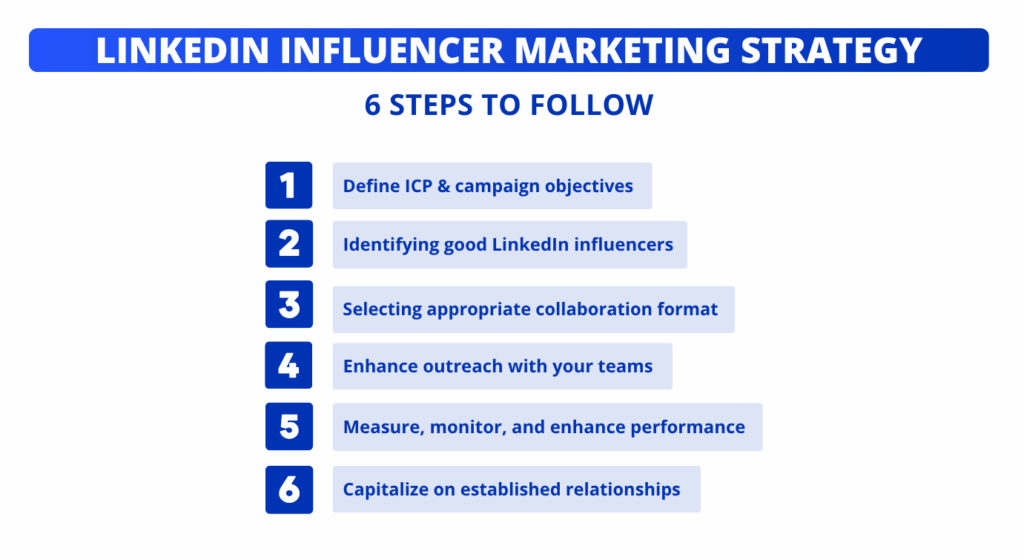
The idea is simple, but the execution requires rigor and consistency.
Collaborating on social media can be a complicated process (especially if long-term partnerships are involved). You need to set clear rules and expectations, as well as expect influencers to sometimes work with rival brands… 🧊
🧭 We give you the best advice on how to get it right.
1. Define KPIs and LinkedIn influencer campaign objectives
Start by clarifying who you want to reach (KPI/target) and what you want to achieve (objectives) from your LinkedIn influencer marketing campaign before choosing who to collaborate with.
👤 The more precise the KPI, the more relevant your marketing targeting, campaign messages, and selected content creators will be:
- Which exact functions do you want to reach (DG, VP Sales, HRD, CMO)?
- In which company sizes, sectors, and/or locations?
- What are the difficulties, interests, aspirations, and concrete problems to be addressed?
- What kind of influencers does this audience follow?
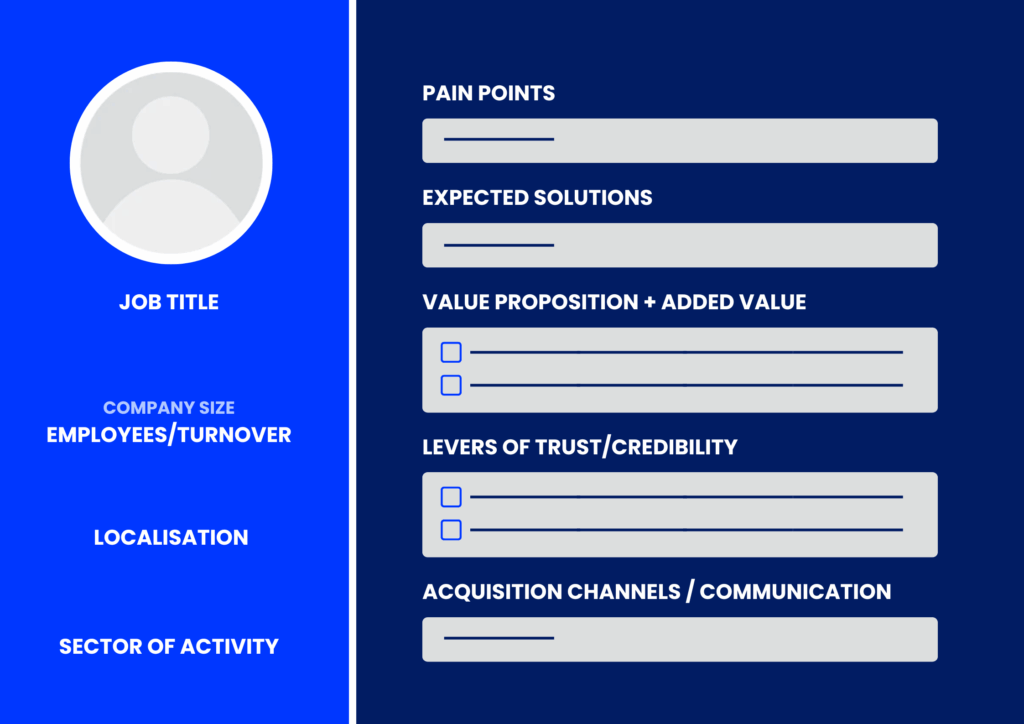
In parallel :
- Clearly define the offer to be promoted (what, when, how…).
- Analyze similar/competitor products or services to find out who they target and how they communicate with this audience.
- Then set clear, measurable objectives: awareness (impressions, share of voice in KPI), engagement (reactions, comments, shares), and lead generation (MQL, SQL, click-through rate, and conversion rate).
- Then set a scope of a B2B influencer marketing campaign on LinkedIn with a number of content creators according to objective and target audience, content formats, duration/schedule, usage rights, and influencer marketing tools to be used.
- Then allocate a coherent budget including fees, content production, and paid amplification.
You should review and optimize the plan regularly. 👀 This will help you achieve better results and ensure that the LinkedIn influencer marketing campaign remains aligned with objectives.
2. Find influencers on LinkedIn
Right, LinkedIn influencers aren’t necessarily the most followed; they’re the ones who make people think and who stand out for the quality of their community (not the size of their audience).
Here are three profiles that have a lot to offer your LinkedIn influencer marketing campaign:
- B2B creators on LinkedIn (experts, consultants, trainers),
- Influential executives (founders, C-levels) ,
- Employee ambassadors (sales, CSM, product, HR).
Their close-knit community fosters authentic connections, leading to greater trust and engagement on LinkedIn (the basis of relationship marketing). 🤝
To find the right influencers, combine a good LinkedIn search (or Sales Navigator for finer filtering) with specialized resources or tools that help verify audience fit and engagement quality (we recommend several later in the article).

Then, to select, look at their recent publications 🔍 :
- Are they regular (helps create appointments and generate more signals)?
- Do they generate well-argued comments, positions, and engagement (an indication of their ability to influence and the potential impact on the success of your campaign)?
- Are their editorial line and values compatible with your positioning?
- Does a majority of their audience correspond to your KPI, niche, or sector of activity?
- What’s their follower count (a less important factor, but those with the most followers tend to cost more, so you need to strike a balance)?
Once you’ve chosen those you want to work with, you need to contact them in the right way with a message containing a direct, personalized value proposition, tailored to their style and engaging 📩 :
- Explain the value of the partnership (visibility/value/experience).
- Quote a specific post.
- Propose a useful idea for the community.
- Explain how you’re going to extend the reach.
- Offer additional incentives (discount codes or exclusive content)…
3. Choose the right collaboration format
Together, write a simple, clear creative brief that fits into your overall LinkedIn influencer marketing strategy to co-create aligned content: ✍🏼
- B2B brand guidelines, communication style and added value,
- Campaign objectives (including expectations in terms of success/performance),
- Market problem to be solved,
- Main message with differentiating point of view and angles to avoid,
- Evidence (cases, figures, testimonials, etc.),
- Formats to be used (the right format is the one that serves the intention and respects the designer’s style); see details in the table below.
| Most common formats | Goals for your LinkedIn influencer marketing strategy |
|---|---|
| Carousel. | Unfold a reasoning or share a method. |
| Simple face cam videos (1-2 minutes). | Humanize/show behind-the-scenes and facilitate CTA. |
| Co-signed post or cross-quote. | Create a network effect and lend credibility to a multi-voiced message. |
| Lives/webinars. | Respond to objections, engage in exchanges, and turn attention into leads. |
| LinkedIn messages . | Create direct, personal contact, engage in conversation, share a quick recommendation, or trigger an immediate action (sign-up, click, comment). |
| Pulse articles. | Build lasting expertise and credibility (lead nurturing or positioning). |
- CTA to use,
- Calendar with key milestones and deadlines (often a series of X publications over X weeks, with repetition to build memorization and improve visibility), including creative time and proofreading.
- Any other important information you need to know.
Don’t look for perfection the first time: the important thing is to launch a clean LinkedIn influencer marketing campaign, then quickly iterate on hooks and formats.
Finally, provide a clear brief (objective, message, timeline, ICP, CTA, tracking UTM via CRM or G4A), but allow freedom of tone: it’s the designer’s personality that will make the difference.
Of course, retain the right to proofread and validate quickly (accuracy, conformity), without distorting: two round trips maximum and a “do/don’t” checklist.
Finally, offer value in exchange, and set the type and level of remuneration for the marketing influencer in relation to the brief.
How is influencer marketing paid ? Influencer paid can take different forms, including: 🤑
– Flat-rate: the influencer charges a fixed amount for creating and sharing content.
– Commission: amount based on the number of sales or leads generated by their content (via a unique link or code).
– Free exclusive products, services, events or information in exchange for content promotion
– Hybrid (fixed fees, commissions, and free products/services).
4. Extend the scope of in-house collaboration
A successful campaign doesn’t end with the designer’s publication.
You need to provide them with support to create content that resonates with their followers, matches your brand’s marketing positioning, and gets your LinkedIn influencer marketing strategy off the ground. 🤝
Activate employee advocacy: brief your teams to comment, repost, or react with a complementary angle. This can amplify/multiply reach up to ×8. 🔥
When recognized contributors add concrete points in comments, the algorithm perceives relevance, and the post circulates further in PKI circles.
You can also amplify published content via paid advertising (LinkedIn Ads) to secure coverage with strategic audiences (job titles, sectors, and company sizes).

Finally, recycle the best posts to reach a wider audience: live, newsletter, nurturing e-mails, blog posts, or even sales presentations…. You do more with less while reinforcing narrative coherence. 🔁
👉 Amplification can multiply reach and social proof without artificially inflating the message, which is what turns a post into a sustainable LinkedIn influencer marketing campaign.
5. Measure, track and optimize marketing performance on LinkedIn
Once the LinkedIn influencer marketing campaign has been launched, track the performance and success indicators defined upstream to optimize the campaign for better results. 📊
1️⃣ Use tools to track mentions of your brand, products, or services on LinkedIn.
2️⃣ Use tools to regularly monitor campaign progress and measure your results against the performance indicators that really matter:
- Lead audience demographics,
- Reach in KPI (not raw reach),
- Quality of comments (decision-makers? hot prospects?),
- Qualified clicks,
- MQL/SQL,
- Engagement and conversion rates by format, hook, and creator.
On the tracking side, use UTM codes, Smartlinks and unique URLs for each post/creator to find out who generates the most results. This will help you determine whether the collaboration has been fruitful and whether you should continue to work with such-and-such an influencer or do such-and-such a post in the future.
3️⃣ Analyze them to understand what worked and what didn’t, and keep testing and iterating. Then make any necessary adjustments to the LinkedIn influencer marketing strategy to improve the campaigns.
4️⃣ Conduct surveys or polls to ask customers about their experience with the product or service promoted by the influencer. For example, complete with a question “How did you hear about us?” on your forms: this will capture the dark social influence.
5️⃣ At the end of your influencer campaign, analyze the return on investment (ROI) in relation to the initial objectives (thanks to all the data you’ve collected), then compare the cost of the campaign with the revenue generated to determine whether it was a success. 💯
Calculate influencer marketing ROI as a percentage: total campaign cost (including influencer fees, content creation, and other expenses) – sales generated by the campaign. Then divide the total by the cost of the campaign.
You can adapt this method for your LinkedIn influencer marketing strategy, but remember that measurement is for decision-making, not reporting: better 5 good actionable insights than a table full of numbers.
6. Capitalize on relationships
One of the biggest levers of success for your LinkedIn influencer marketing strategy is duration. 🦾 A one-off campaign generates visibility.
But a long-term/serial partnership builds trust, benchmarks, and brand memory (and therefore helps establish a loyal customer base and increase your brand’s reach).
So maintain and nurture good relationships with your B2B influencers. Suggest 👇🏼:
- A Creator Council: 4-6 experts taking turns to speak,
- A quarterly cycle with 3 key contents (carousel, live, short study),
- One theme per quarter (e.g. onboarding, activation, loyalty),
- A recurring event…
Share news, exclusive data, case studies, or product betas to keep them engaged. The more involved they feel, the more committed they’ll be, and the more authentic and impactful their content will be.
Influencer marketing strategy is all about human relationships.
Top LinkedIn influencer marketing tools to use
⚙️ Using the right tools is not a luxury: it’s what turns a partnership idea into a fluid, measurable, and duplicable campaign.
LinkedIn influencer marketing tools save time and avoid oversights. Without them, your time is quickly spent on private messages, spreadsheets, and copying and pasting URLs.
They are numerous and can help you to:
- Identify and select the right influencers according to various criteria (location, niche, engagement rate, demographics…) and sometimes thanks to AI,
- Connect and facilitate collaboration between influencers and brands (e.g. to interact, negotiate agreements according to their specialty, share briefs and validations, execute campaigns, manage payments, centralize exchanges…).
- Create campaigns, automate, and reach objectives faster.
- Track influencer content performance data and the success of LinkedIn influencer marketing campaigns to facilitate decision-making.
- Perform strategic/competitive intelligence and detect influencer marketing trends among a target audience to be better, create more influence, and go viral.
Before choosing the best course of action for future prospecting campaigns, clarify your need and consider the following factors to invest in the right tools: 💰
- User-friendliness: prioritize tools that are simple, quick to learn, and well integrated into your LinkedIn stack. Your team needs to be able to launch a campaign without going through complex training.
- Budget: opt for a solution adapted to the size of your team and the frequency of your campaigns (test with modular packages and free trials).
- Key functionalities: check that the tool covers your concrete needs and has all the functionalities you require.
🤗 I hope you find these tips useful in your search for LinkedIn influencer marketing tools!
18 Best tools for creating LinkedIn influencer marketing campaigns
We recommend the best influencer marketing tools to use, in our opinion, for your influencer marketing campaigns on LinkedIn 👇🏼, but the best way to go about it is to try out some of these tools for yourself and see which ones work best for your specific needs!
| Tool | Main function | Type of use for LinkedIn influencer marketing campaign |
|---|---|---|
| Sales Navigator. | Manual detection and prospecting. | Ideal for mapping your KPI and identifying creators and circles of influence (roles, sectors, and seniority). Perfect for marketing and sales teams looking for precise targeting (by function, sector, and target B2B companies). |
| Modash. | Audience verification and engagement rates. | Excellent for discovering LinkedIn creators and validating the relevance of their audience or RE, as well as tracking their performance. Useful for SMEs and agencies seeking to measure engagement quality before collaboration. |
| Favikon. | Influencer audit and scoring. | Evaluates the credibility and authority of Top Voices or influencers on LinkedIn through scoring. Ideal for benchmarking (details on the number of followers, engagement rate, and demographic data to facilitate influencer selection) and checking the match between audience and quality of engagement before partnership. |
| Kawaak. | All-in-one tool. | Generate publications, visuals, and comments using AI. But also track performance and manage briefs, approvals, applications, and sponsored content (to be combined with advocacy) and payments between brands and creators. Perfect for launching and monitoring multiple LinkedIn influencer marketing campaigns. |
| Upfluence. | Sourcing + management + reporting. | Complete platform for finding, managing, and tracking LinkedIn influencers on LinkedIn. Good compromise between functionality and cost for mid-market structures or agencies. |
| Traackr. | Governance and compliance. | Designed for large corporations: manages multi-country campaigns with global tracking, reporting, and enhanced brand safety. |
| CreatorIQ. | Complete influence suite. | Enterprise solution for sourcing and managing the entire influence cycle (research, performance, ROI). Ideal for international brands. |
| Shield. | Creator Analytics. | Highly detailed analysis of LinkedIn profiles and their evolution over time: useful for creators, managers, or internal teams to track the evolution, impact, and KPIs of posts. |
| LinkedIn Analytics. | Native data (pages & profiles). | Native dashboard for tracking reach, impressions, and engagement. Indispensable for any brand or creator. |
| Waalaxy. | Automation (outreach). | Ethical, personalized LinkedIn automation for contacting creators or prospects. Time-saving and secure. |
| Figma / Canva / CapCut / Descript. | Content marketing creation (visual & video). | Accessible tools for designing carousels and native LinkedIn videos. Perfect for in-house producers. |
| StreamYard / LinkedIn Live. | Live event production. | Simplifies the organization of live events, webinars, and interviews on LinkedIn. Ideal for engaging and humanizing the brand. StreamYard facilitates registration, chat, and replay. |
| Notion/Coda | Coordination and framing | Enables influencer campaigns to be planned, monitored, and documented as a team. Promotes clarity and centralization of information. |
To start your influencer strategy, a light stack is often sufficient (combine a sourcing tool, an “orchestration” tool, and an analysis tool): 🪶
- Beginner/SME → Minimalist stack: Sales Navigator or LinkedIn Analytics + Modash + Shield to spot the right creators, check relevance, and track performance (covers 80% of needs).
- Structured/industrialized campaigns → Add Kawaak or Upfluence for operational management (manage briefs, validation, and campaign tracking).
- Enterprise / multi-country → Combine Traackr + CreatorIQ + Kawaak to amplify and boost reach in your ICP.
- Independent creators → Favikon + Shield + Canva/CapCut to manage and optimize visibility.
Observe current benchmarks (ER per impression of around 5% is a good base), then iterate every two weeks: keep what works, and adjust the rest.
Top 2 tools for automating LinkedIn influencer marketing campaigns
You’ve got everything you need to launch and grow your campaign. But, you’ll really need to use the following 2 tools to create a virtuous circle of engagement around your LinkedIn influencer marketing strategy.
Kawaak and Kawaak Influence
Kawaak 🐰 is a LinkedIn post generator designed to write with AI and plan and optimize your publications in just a few clicks.
In just 30 minutes, you can create weeks of content based on your expertise, without needing to spend hours in front of a blank page.
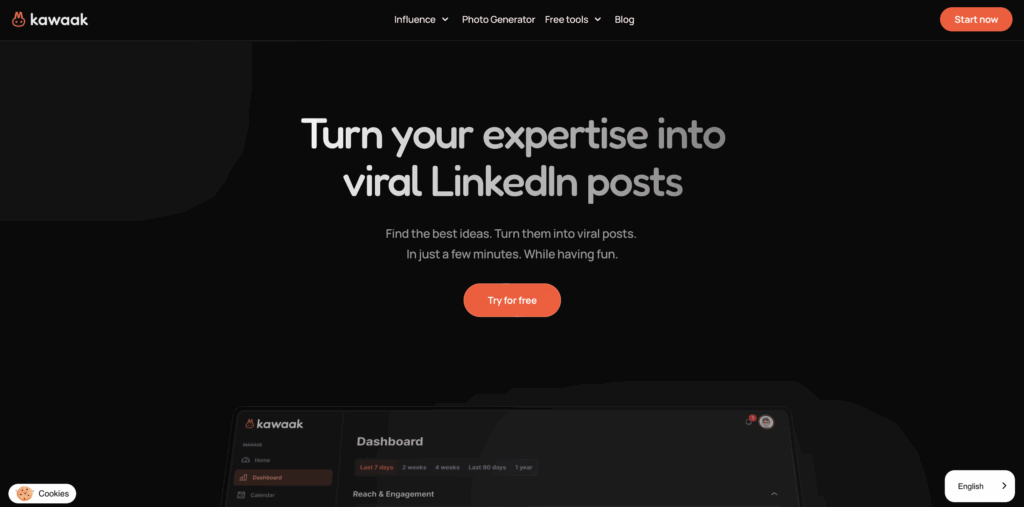
🔑 You enter some key info, and Kawaak generates for you:
- Several punchy hooks to test,
- Ready-to-use versions of copyrighted posts,
- Edit, program, and publish directly from the platform.
🤩 You can also use Kawaak for different stages of your influencer strategy:
- Do smart repurposing (transform a high-performance post into a carousel, video, infographic…).
- Generate impactful visuals with a single click: generate a quote card with a content extract/punchline, and even generate images of yourself (portrait, professional photo, street photo, casual photo taken on the fly…).
- Generate high-impact comments with AI directly on content in your LinkedIn feed, thanks to the Chrome extension.

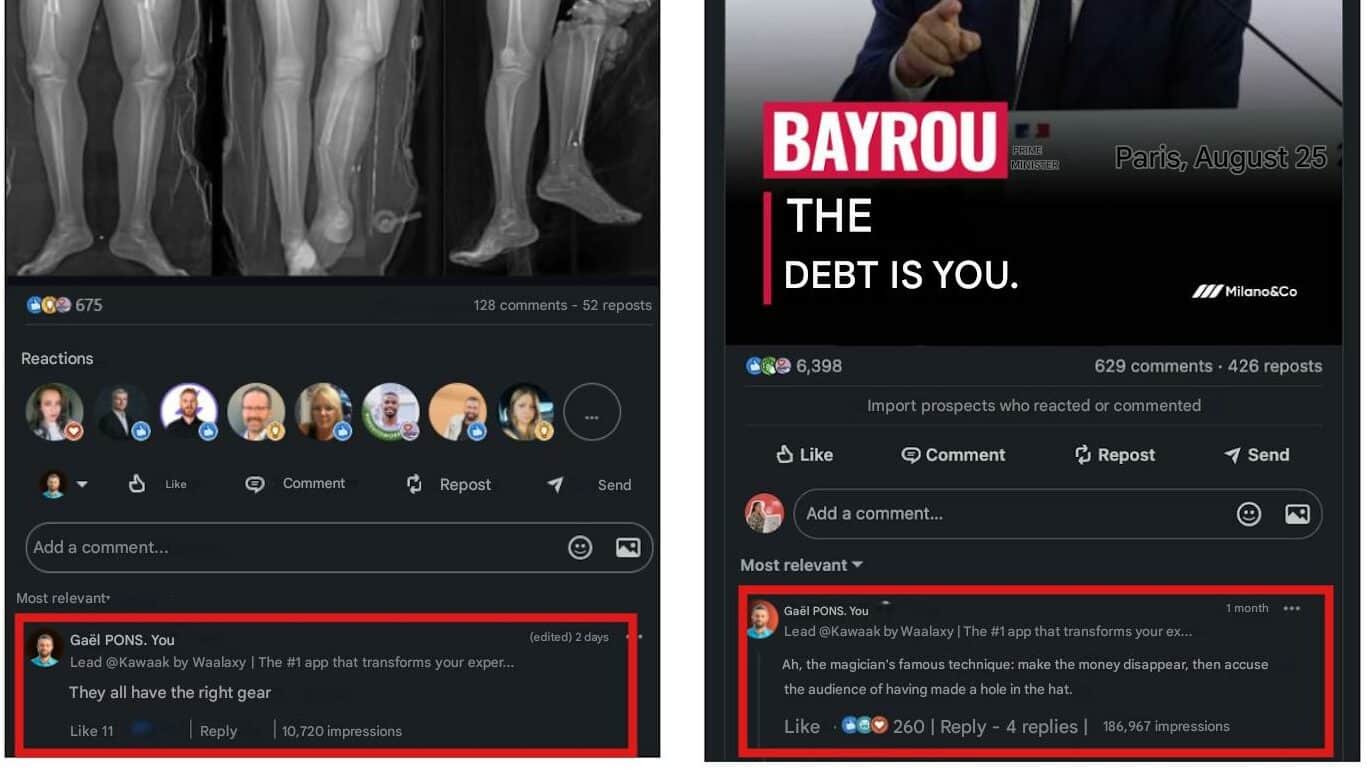
- Use Kawaak Influence to identify and brief the right designers, to apply for or launch LinkedIn influencer marketing campaigns that reflect both the designer’s image and the brand, calculate the price of posts, and pay the influencers.
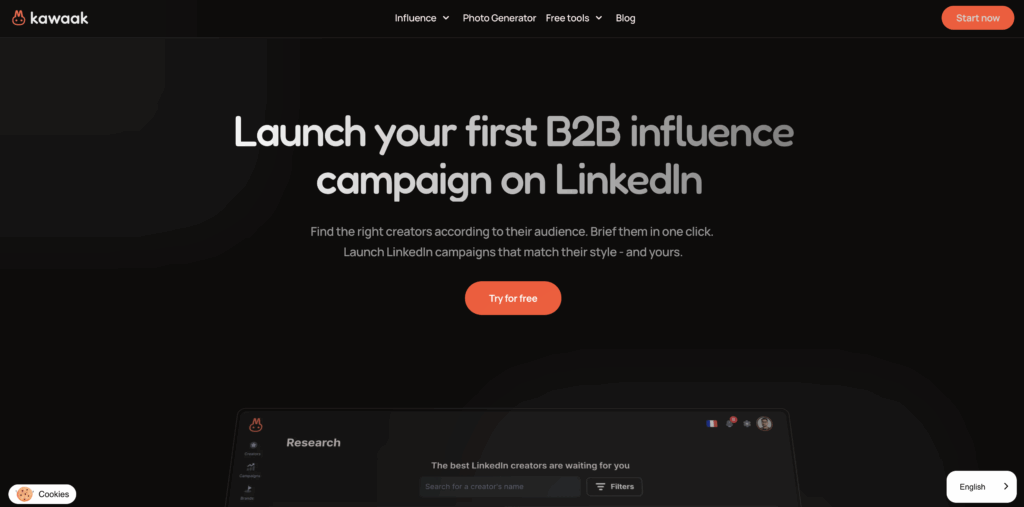
- Access an ultra-complete tracking dashboard.
Ideal for staying regular (especially if you’re struggling to keep up on your own), testing formats, and engaging more with less marketing effort.
🚀 Already, over 16,000 users have adopted Kawaak. So why shouldn’t you?
Waalaxy
👽 Waalaxy is a high-performance, easy-to-use tool that automates your LinkedIn prospecting and influencer marketing campaigns—quickly, efficiently, and effortlessly.

Unlike other complex, technical solutions, Waalaxy is designed for teams who want to save time while retaining a personalized approach. 😈
What Waalaxy enables in concrete terms for LinkedIn influencer marketing:
- Intelligent creator detection and targeting: automatically auto-import profiles via LinkedIn from your searches, publications, or events, and segment them according to your KPIs, sector, position, or level of engagement.
- Automated, customizable outreach: create sequences of actions (profile visits, invitations, follow-up messages) to connect with potential influencers, ambassadors, or partners—without spending hours writing manually.

- Access a database of 500M+ qualified profiles, automatically enriched with the best Email Finder on the market.
- Team Plan and CRM sync: collaborate as a team on multiple LinkedIn accounts, track centralized results, and synchronize your data directly with HubSpot, Pipedrive, Salesforce, or Zapier/Make.
- Manage your conversations in the Waalaxy Inbox: centralize all your LinkedIn exchanges in one place, segment your contacts, prioritize messages, and easily follow up with your creators or hot prospects.

- Real-time dashboard: track your KPIs (response rate, connection rate, and creator interactions) and measure the performance of your influencer campaigns.
In short, Waalaxy saves you time at every stage of your LinkedIn influencer marketing campaign, from detecting creators to managing conversations, while maintaining an authentic, 100% GDPR-compliant approach.
The result: more visibility, more qualified connections, and above all more successful influencer partnerships on LinkedIn. 💥
LinkedIn influencer marketing campaign example
Kawaak Influence recently launched one of the largest B2B LinkedIn influencer marketing campaigns to date, with over €100,000 of sponsorship budget split between more than 500 creators. 🤯

The aim: to enable micro-influencers and LinkedIn social network experts to collaborate easily with tech brands such as Notion, Waalaxy, Submagic, PayFit, HOOX, Kalent, ReactIn, and Arcads AI… and a dozen others.
This initiative perfectly illustrates the rise of more accessible, measurable and authentic B2B influencer content strategies, where the quality of insights and the credibility of creators take precedence over audience size. 💎
But above all, this LinkedIn influencer marketing campaign was a runaway success: 🏆
- 50 LinkedIn publications.
- 1,500 clicks generated.
- 500 new creator registrations.
- €142,700 in applications received in just a few days (that’s INCREDIBLE).

86% of US B2B marketers and 73% of brands plan to collaborate with influencers in 2025.
Conclusion—Differences between LinkedIn influencer marketing and “standard”
In conclusion, LinkedIn influencer marketing is radically different from traditional B2B marketing.
🚨It’s not about selling a product with trends or emotional storytelling, but about sharing ideas, experiences, and tangible evidence.
Employee “ambassadors” and creators play a central role in the influence strategy: they document daily life, share learnings, and expose their successes and sometimes their mistakes. This approach builds trust and credibility, rather than instant acceptance.
Unlike Instagram or TikTok, where the decision is often impulsive, LinkedIn influence is progressive and rational: it takes several points of contact, several formats, and several validations before a demonstration or appointment is possible. ⏳
LinkedIn influencer marketing focuses on expertise, with each post aiming to bring the brand closer to its audience, one insight at a time.
Frequently asked questions (FAQ) about influence on LinkedIn
What other best influencer marketing platforms are there?
All social media platforms remain powerful but don’t serve the same objectives or audiences 🧲 :
- Instagram is great for aesthetics and quick awareness (it remains the most widely used platform for influence: around 80.8% of marketers report using it for their campaigns in 2025).
- TikTok for discovery and massive reach,
- YouTube for long-form educational content,
- Twitch for live events.
- Snapchat for ephemeral, authentic, and immersive content.
- Pinterest for visual and evergreen inspiration (lifestyle, decorating, DIY, etc.).
- LinkedIn maintains its B2B advantage when it comes to target functions, longer decision cycles, and proof.
- Facebook: organic use declining but still interesting as a complement for certain B2C niches.
In short, use the best LinkedIn marketing & influencer platforms/channels that are the most active and adapted to your industry and target.
Nothing prevents bridges in your LinkedIn influencer marketing strategy: a YouTube talk re-edited as a LinkedIn carousel, a TikTok clip reformulated as a face cam video plus “pro.” The choice isn’t binary: start with the target’s natural presence, then replicate or adapt the message in a format native to each platform.
What’s the difference between LinkedIn influencers and LinkedIn creators?
In BtoB, this nuance changes everything. 👇🏼
- The LinkedIn influencer is defined by his ability to mobilize an audience; he can quickly spread the word about something.
- The “LinkedIn” creator, on the other hand, is defined by the regular production of useful ideas: he shares methods, opens the hood, documents his work, and builds the trust that (later) triggers a demo or a purchase.
On the brand side, collaborating with a designer means accepting a personal tone and a share of the unexpected: you gain in authenticity what you lose in control.
It also means investing in the long term: a series of LinkedIn posts, recurring webinars, and a newsletter with a real editorial line. As a result, conversion is less “instantaneous” but more qualified.
If you have to choose, favor marketing experts in your niche: they talk about real problems, attract the right readers and lend credibility to your product by osmosis rather than injunction. ✨
What is UGC in influencer marketing strategy?
UGC (User-Generated Content) refers to any content—posts, videos, reviews, or testimonials—created by users or customers rather than brands.
In influencer marketing strategy, UGC often comes from creators who produce authentic, relatable content about a product or service they’ve used.
Unlike traditional influencer ads, UGC feels organic: it’s storytelling through real experiences, not scripted promotion. Brands repurpose this content across ads, landing pages, and social media to boost credibility and social proof.
In 2025, UGC is one of the fastest-growing forms of influencer collaboration because it combines authenticity and scalability: creators produce high-quality assets that convert, while brands save time on production.
In short, UGC turns your customers and creators into your most powerful marketing team. 🚀
How much do influencers get paid for marketing?
Costs of campaigns vary according to audience size, LinkedIn niche, format, usage rights, and duration… 💰 (generally from a few hundred to several thousand euros per deliverable depending on rarity of expertise, quality, and value creation and not just on gross reach).
In practice, many teams start with a 4-6 week pilot with 2 or 3 designers to identify effective hooks and audience fit.
We often talk about a fixed fee per deliverable (€247/post on average), a hybrid model (fixed fee + performance bonus), or performance-based agreements (codes, UTM, objectives).
To set rates, use realistic KPIs (ICP reach, comment quality, qualified clicks, MQL/SQL) and compare with current benchmarks.
The bottom line: pay for value creation (insights, education, trust), not just raw reach.
It’s still possible to do influencer marketing without a budget, thanks in particular to :
–Employee branding & advocacy, which allows you to mobilize in-house authors to publish every week to attract decision-makers without a euro of paid.
– Unpaid but mutually beneficial co-creation (exchange value).
– Content recycling and repurposing.
When you know what works, gradually add a budget. Energy replaces cash at first, but consistency is the real gas pedal.
That’s it, you’ve got everything you need to build a killer LinkedIn influencer marketing strategy! Now it’s up to you! 🕹️


